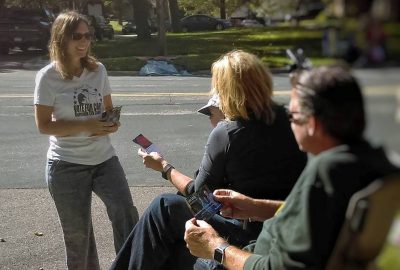16 Common Mistakes of Libertarian Campaigns
16 Common Mistakes of Libertarian Campaigns

By Carla Howell
Last update March 24, 2017
Learn from the mistakes of many who came before you. Run a smart Libertarian campaign!
1. Putting time, money and energy into ads and other campaign activities before you secure your place on the ballot
Getting on the ballot is priority # 1 and comes before everything.
Until you’ve made the ballot or have virtual certainty that you will, don’t spend money on yard signs, videos, ads or any other campaign expense – except a low-cost website or whatever may be needed to raise funds to get on the ballot, such as to fund a petition drive or filing fees.
Jim Ogonowski, the favored 2008 Republican for U.S. Senate in Massachusetts, embarrassed himself and his party– and ended his career as a candidate – when he produced and posted to his website several high-production campaign videos, then subsequently failed to make the ballot because he fell short of turning in the required number of petition signatures.
You owe it to those who give of their time and money to your campaign – and especially those who give specifically to your petition drive – to ensure their contributions are not wasted.
Note that most states and localities publish a candidate bulletin for every public office, detailing what needs be done to get on the ballot, or to have you identified as a Libertarian candidate if you make the ballot. Get that bulletin and read it thoroughly.
But even official election publications can be unclear or incomplete. If you have any questions about how to get on the ballot, call your state party, your state’s elections authority, and/or contact Bob Johnston, Candidate Support Specialist for the Libertarian National Committee at campaigns@lp.org. Check in with elections officials during the process, well before the deadline, to ensure you’re on track and have filed everything correctly. Where possible, get written confirmations.
Priority #1: Get yourself on the ballot!
2. Failing to file necessary forms with elections and ethics authorities
Few things are as infuriating as getting knocked off the ballot or fined because you didn’t fill out a form correctly, use the correct form, or file it on time.
Don’t let this happen to you. Follow election regulations to the T.
Note that there may be more than one government agency with whom you have to file, such as a campaign finance board and/or an ethics committee, in addition to elections officials. Failing to file all required forms could disqualify your campaign. So be sure to file correctly and on time.
3. Having no campaign website
Having a Facebook page is great, but it’s not enough.
Media and voters look for campaign websites when they’re deciding who to vote for. They need to quickly learn what you stand for and get basic information about your campaign.
Even a one-page website that provides your contact information and your core Libertarian solutions is essential. Volunteers can often do this for you. There are web building services such as Weebly or Wix available on the Internet that are relatively cheap and easy to use.
If you plan to accept donations on the web, you need to open a checking account and an account with a service such as PayPal or Piryx that processes payments first.
4. Failing to offer persuasive Libertarian proposals for making government smaller
Everything you need to know is in the LP campaign guide Game-Changing Libertarian Communications. Be sure to read this guide in its entirety. It will take you about an hour, and reads easily. Keep it on hand as a resource.
5. Claiming you’re going to win without evidence
Without any polls to show how many voters are likely to vote for them, many first-time candidates will get a good feeling about their campaign and claim they’re going to win the election. But usually their chances of winning an election at the level of state legislature or higher are extremely small.
With relatively meager funds and lack of institutional support, the only way most Libertarians can win at this level is with extraordinary luck. For example, if all of your major opponents are caught committing serious crimes or fall ill and their parties do not have the ability to substitute another candidate (in many states, Democrats and Republicans have this prerogative).
Although the LP is the third largest party in America, it is not uncommon for Libertarians to end up with a lower vote total than another third party or independent challenger, especially if the latter gets generous media coverage, is better organized, or if the district favors his or her ideology.
Even at the local level, only 4% of Libertarians who ran for office in 2014 won on Election Day.
Can you still present yourself as a winner? Absolutely! See more about how to respond to “horse race” questions in the campaign guide Game-Changing Libertarian Communications.
Where winning is not likely, set realistic, measurable and meaningful goals for the success of your campaign, such as (fill in the blanks):
- Achieve ballot access for future Libertarian candidates
- Distribute ___ number of yard signs, ___ bumper stickers, ___ hand cards
- Collect ___ names of supporters with phone numbers and email addresses
- Get booked to speak at ___ events or media interviews
- Attend ___ campaign events
- Register ___ new Libertarian voters
- Enroll ___ new members in the LP
- Get ____ followers or _____ friends for your campaign Facebook page
- Raise ___ dollars
Achieving goals like the above will:
- grow the Libertarian Party and the liberty movement;
- grow a base of supporters who will support future Libertarian campaigns;
- build your name recognition should you choose to run again in the future;
- demonstrate that your campaign reached everyday voters, gave them a choice, and built acceptance and support for actually reducing Big Government and advancing liberty;
Once you’ve determined your campaign goals, write them down and organize your campaign around them. Plan to assess your campaign’s success in meeting those goals after the election – and celebrate your achievements!
6. Refusing to accept campaign donations on moral grounds
Some Libertarian candidates assert, “I’m not accepting donations because money in campaigns is evil.”
This view is misguided. Only money used for certain purposes in campaigns is evil from a Libertarian, small government perspective.
When a government union, government contractor, government-protected cartel, or foreign government donates money to Democratic or Republican politicians, they’re looking for government contracts, protections, or favors in return. It can be likened to paying off a judge to rule in your favor in a civil suit. It is a huge conflict of interest!
In contrast, Libertarian candidates are outsiders who get their donations from individuals for the purpose of advancing freedom and shrinking Big Government. People do not donate to Libertarian campaigns for government favors or handouts. Rather, they donate to take away the government’s power to grant favors and handouts to special interests.
Donations to Libertarian campaigns pay for brochures, yard signs, bumper stickers, ads, and other ways of informing voters of a choice for less government. There is no conflict of interest. Candidates and their donors are merely exercising their First Amendment right to free speech and freedom of the press.
If you choose not to raise funds because you don’t have the time to run a serious campaign or don’t believe you can raise enough money to make it worth the campaign finance reporting requirements that would ensue, fine. This makes sense for some candidates.
But whatever you do, do not confuse immoral and destructive campaign donations made by special interests to Democratic and Republican campaigns with very legitimate, constitutional, and morally justifiable campaign spending of Libertarian donors who simply want freedom.
Thomas Paine’s pamphlet Common Sense was instrumental in bringing about the American Revolution. It was some of the best money spent on campaigning in world history. A cause for Libertarians to celebrate!
7. Expecting financial support from your state or the national LP
The Libertarian Party is a small, grassroots organization. The national party does not have the funds to donate to Libertarian campaigns. If it were to make a priority of doing so, it would not likely have enough money to make a dent in even one Libertarian campaign, much less the hundreds of Libertarian campaigns that take place every election cycle.
State LP affiliates don’t have the funds either.
A better approach is for candidates to solicit funds directly from donors. This requires candidates to demonstrate that they are donor-worthy, which includes taking the initiative to ask for money – an essential skill for successful candidates. Each potential donor can then decide for himself/herself whether to contribute to particular candidates. In other words, let the marketplace, rather than a committee, decide which candidates have demonstrated that their campaigns deserve financial support.
Check to see if your state LP affiliate offers use of their membership list. Other sources may include local affiliate lists, voter registration lists or list brokers who license use of lists. Seasoned LP activists in the state may also have a list they’d be willing to share with a strong campaign.
Note that Democratic and Republican parties generally don’t donate to their candidates either – except those who have already raised substantial money on their own and whose polls show they can win.
8. Neglecting to take advantage of resources your state and local affiliate may offer
Ask your state or local Libertarian Party affiliate what its policy is for use of its membership and prospect list.
LP affiliates have their own policies as to (1) whether they make use of the list available to candidates and (2) if so, under what terms. Some may charge a use fee. Some may allow use of the list through a third party, such as a bonded mail house. Others may send out emails for you.
They may also be willing to:
- Post campaign information on their Facebook page or website, or through other social media.
- Cover your campaign in their newsletter or emails to members
- Give you a speaking slot at your state convention, if your campaign merits it.
- Give you copies of their media list, to which you can send press releases.
- Offer space on their web server to host your campaign website.
- Allow use of their email marketing service to send email blasts to voters or to your campaign’s list.
Keep in mind that every affiliate is different and may or may not have people available to help with these issues, or in some cases, to even respond to your inquiry. There may also be campaign finance regulations that limit an affiliate’s ability to support campaigns.
If no one is maintaining your state LP’s website, you might want to offer to update it yourself, or get one of your volunteers to do so. If no one is sending out regular emails to party members and prospects, your local or state affiliate may be happy to have you and other Libertarian candidates in your area use the list to inform members of your campaigns.
9. Failing to ask for volunteers
The more volunteers you enlist, the better your campaign will do.
Enrolling volunteers gives them an opportunity to contribute, especially those who don’t want to be candidates. Those who may be interested in running for office someday get valuable training by working on your campaign.
Start by asking personal friends or family members who want to help you. Then ask every activist you know in your state or whom you meet if they will volunteer for your campaign. Ask if they have suggestions of others who may be available to volunteer.
Importantly, you need to have a treasurer to ensure you meet all filing and reporting requirements, especially if you expect to raise money.
And of course, you need whatever resources are necessary to ensure you make the ballot. Volunteers may be needed, not just to gather petition signatures, but also to print, pick up or deliver blank petition forms; count signatures collected; validate signatures; or turn in completed petitions.
10. Neglecting to collect the names of potential supporters everywhere you go
The names you collect on the campaign trail will become a key component of your campaign mail list (email and snail mail) as well as any campaign you may run in the future. You can use them to appeal for petition signatures, volunteers, donations, votes and to attend events.
Bring sign-up sheets with you every time you or your volunteers go canvassing, give a speech, attend Libertarian events, attend community events, or go anywhere where you might meet a potential volunteer, supporter or donor.
Alternatively, bring tablet(s) to enter names electronically on location so you won’t have to type them in later. This also enables you to confirm that the contact data you collect is accurate, and if not, to correct it on the spot. This is helpful since handwriting on sign-up forms is often illegible and therefore unusable.
Then be sure to actually collect the contact information of every attendee at the event who is willing to give it. You may want to bring clipboards and pass them around the room for people to sign up. Many will happily oblige if they’re at all aligned with your message.
Train your volunteers to “work the room” and collect this vital information everywhere you / they go.
If you knock on doors, be sure to bring – and use – sign up cards.
At the end of an event, count and announce to your volunteers how many names you all collected – and celebrate! This is a key measure of your success. It will also clue you into which events are more productive for your campaign than others.
After you collect names, enter them in a spreadsheet or database right away. Send each person some kind of message – a welcome email message, an appeal to volunteer or donate, a Facebook friend request, or simply subscribe them to a regular campaign newsletter – as soon as possible. Be sure to tell them you’ll be sending campaign updates when they give you their contact information.
11. Being a wallflower at public events
Some candidates shy away from crowds. Or they wait for voters to approach them at events. This is a missed opportunity.
Candidates need to make direct contact with voters whenever possible.
Make it your goal at every campaign event to mingle and shake the hand of every potential voter in sight (and their spouse, kids, and friends). Introduce yourself and make eye contact. Don’t be looking at the next person while you’re still conversing with someone. Give them a moment of your time and your full attention, but be sure to move quickly enough to meet everyone in the room.
12. Neglecting to send thank you notes to donors
Many who give generously are offended when they don’t receive thanks in return. This is especially true of major donors. Some will never donate again – who would have, if they’d received simple thanks from you.
It’s also a matter of common courtesy. Yes, as a candidate, you’re doing the heavy lifting and making the biggest sacrifices. But for many donors, they may have sacrificed substantially too.
Hearing thanks from the candidate means a lot to many donors – and often leads to more donations. So thank them!
Send a thank you card or postcard by snail mail, signed by you – not an email or text message.
You may also want to acknowledge them publicly, but be sure they have no objection to this. Some donors want to remain anonymous (even though you may have to report their donations in campaign finance reports).
13. Neglecting to thank and publicly acknowledge your volunteers
Your personal thanks, along with public recognition of their contributions, are the currency of volunteering. Be sure to regularly thank and publicly acknowledge your volunteers, especially your key contributors.
14. Trying to write ad copy without training or study
Writing ads is a specialized skill. Top copy writers make big bucks because it’s hard to do well, and because they get big results.
Knowing where to place ads and get the biggest bang for your advertising dollars is also a specialized skill that requires in-depth knowledge of the ad market in your district.
Yet hiring qualified professionals for these tasks is often beyond the means of Libertarian campaigns. Consider spending your campaign funds instead on yard signs, bumper stickers, get-out-the-vote hand cards, event announcements and other straightforward communications. They may do just as well as ads, reach more people, and cost far less.
If you’re going to run ads, try Facebook and other social media. You can spend very little and get immediate feedback as to whether your ad is producing, then decide whether to spend more.
Stick to simple messages and slogans that highlight voter benefits (see the guide Game Changing Libertarian Communications for suggestions).
15. Neglecting to prepare and practice for every speech, media interview, and debate
Consider that if you don’t have time to properly prepare for these important events, you may want to turn them down. A poorly prepared candidate can do more harm than good for his campaign.
Start your preparation by reading the LP guide Game-Changing Libertarian Communications
16. Taking political advice from non-Libertarians
Certain nuts and bolts campaign activities are the same for all candidates, regardless of their political ideology. This includes things such as petitioning (although different rules may apply for alternative parties), certain aspects of connecting with the media, fundraising, recruiting volunteers, printing campaign materials, etc. You may benefit from campaign training courses designed for Democrats or Republicans that cover generic campaign topics such as these.
However, be cautious, especially when the subject turns to messaging. Republicans and Democrats work to advance their Big Government agendas – in subtle ways that you (and even they) might not notice. Whenever possible, seek the advice of tried-and-true Libertarians instead. As always, read the LP guide Game-Changing Libertarian Communications.



